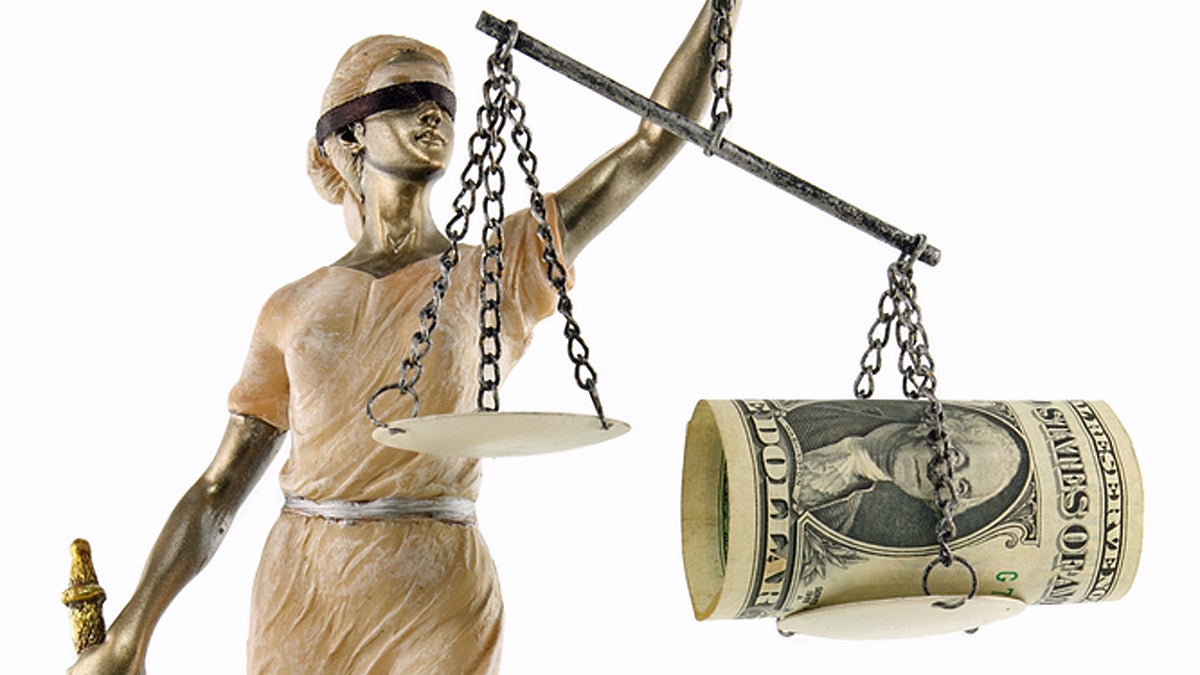Supreme Court winks at judges for sale
 Photo via ShutterStock) " title="ssladyjusticecorruptionx1200" width="1" height="1"/>
Photo via ShutterStock) " title="ssladyjusticecorruptionx1200" width="1" height="1"/>
(Photo via ShutterStock)
Electing judges is moronic. You need to know how I feel before you read on.
Putting judges on the ballot, compelling them to campaign for office, basically codifies corruption. In fact, the political hackery is endemic in the 39 states – including Pennsylvania – that hold judicial elections . Lawyers routinely donate to judges, then argue their cases in front of those judges; business groups donate to judges, who return the favor by issuing a disproportionate number of pro-business rulings.
There’s no way that the U.S. Supreme Court would ever put a stop to these craven practices, even if an ideal case got teed up, because the money-equals-speech majority believes that judicial campaigners (like all campaigners) are merely exercising free speech. Which is why it was so momentous this week when the court surprisingly decreed that one teensy weensy aspect of electing judges was just a wee bit over the line. For those of us who hate judicial elections – heck, most Americans hate the attendant corruption – this is what counts as a great victory. Grading on a curve, anyway.
In a 5-4 ruling – with John Roberts joining the Democratic-appointed quartet – the court upheld a Florida law that bars judicial candidates from personally soliciting prospective donors. Roberts essentially wrote that it’s tacky and political for an aspiring judge to ask people for money. His key line: “Judges are not politicians, even when they come to the bench by way of the ballot.”
Does this guy need to get out more, or what?
That’s the most naive thing Roberts has said since he gutted the Voting Rights Act, writing that the law’s enforcement powers were no longer needed because “things have changed dramatically” on the racial front. In his mind, a judge who asks people for money is a politician, and that’s out of bounds – yet, in his mind, if a judge has a campaign committee staffed by fundraisers who go out and ask people for money (which is the norm in those 39 states), then apparently that judge is not a politician.
The very act of campaigning turns all judges into politicians. The British-run Economist magazine riffed last summer on our peculiar American practice, and wrote: “It is fine for a politician to make deals with voters, to say, ‘Vote for me and I’ll raise the minimum wage’ or ‘Vote for me and I’ll cut taxes.’ But it is an abuse of power for a judge to promise – or even hint – that he will decide future cases on any basis other than the facts and the law.”
Heck, judicial candidates don’t even need to hint; the quid pro quos need not be said.
Two years ago, the American Constitution Society, a nonpartisan judicial watchdog group, did a massive report that linked donations to rulings. Researchers examined 2,345 business-related state supreme court opinions, and matched them to campaign finance records. They found “a significant relationship between business group contributions to state supreme court justices and the voting of those justices in cases involving business matters….The more campaign contributions from business interests justices receive, the more likely they are to vote for business litigants appearing before them in court. Notably, the analysis reveals that a justice who receives half of his or her contributions from business groups would be expected to vote in favor of business interests almost two-thirds of the time.”
Deep-pocketed donors know all this, which is the big reason why total spending on state supreme court races was 250 percent higher in the first decade of the new century, when compared to the ’90s – a stat unearthed by the NYU Brennan Center and the National Institute on Money in State Politics. But we Pennsylvanians have long been cognizant of the political hackery. Back in the ’90s, state Supreme Court judge Rolf Larsen was impeached for taking too much case advice from a home-town political supporter.
So this notion that elected judges are not politicians as long as they don’t personally ask for money? That’s just a fig leaf; it doesn’t begin to conceal the systemic sleaze.
One retired U.S. Supreme Court justice understood this, writing in 2010: “We all expect judges to be accountable to the law rather than political supporters or special interests. But elected judges in many states are compelled to solicit money for their election campaigns, sometimes from lawyers and parties appearing before them. Whether or not those contributions actually tilt the scales of justice, three out of four Americans believe that campaign contributions affect courtroom decisions…The crisis of confidence in the impartiality of the judiciary is real and growing. (Without reform), the perception that justice is for sale will undermine the rule of law that courts are supposed to uphold.”
Yeah. What Sandra Day O’Connor said.
——-
Happy “Mission Accomplished” Day! Time to pay homage to the neoconservatives’ flight-suited front man, and the brilliant work he did in Iraq. Here’s what I wrote two years ago, on the 10th anniversary.
Follow me on Twitter, @dickpolman1, and on Facebook.
WHYY is your source for fact-based, in-depth journalism and information. As a nonprofit organization, we rely on financial support from readers like you. Please give today.

